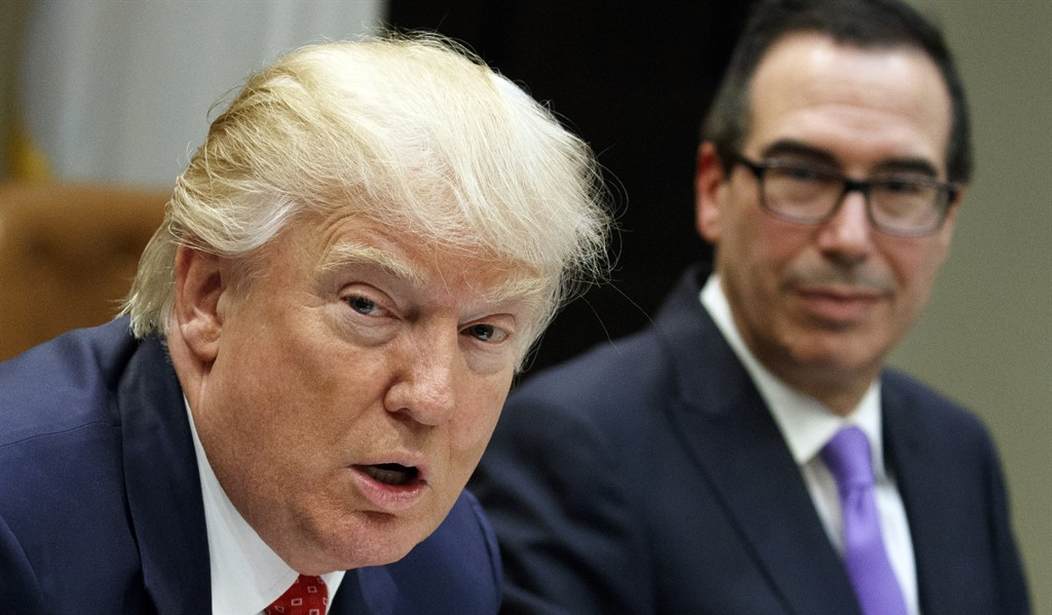The border wall may be up for negotiation — or redefinition — but Donald Trump plans to stick to the literal when it comes to his pledge to cut the corporate rate. The White House will release a formal proposal tomorrow to cut the tax rate from 35% to 15%, part of the Trump agenda to boost the economy and create jobs in the US. The Washington Post calls it a “drastic” cut, one that carries a hefty price tag:
President Trump is pursuing a drastic cut in the corporate tax rate, a move that is likely to grow the national debt and breach a long-held Republican goal of curbing federal borrowing.
The president has instructed advisers to propose cutting the corporate tax rate from 35 percent to 15 percent, according to White House officials who said they were not authorized to speak publicly about the plan. The rate reduction — which independent budget experts say could cost the federal government $2.4 trillion over a decade — is larger than what House Republicans had proposed in their own plan.
Treasury Secretary Steven Mnuchin disputes the budgetary impact, claiming that growth will provide the difference:
Trump has pledged that the tax cut in total would be the largest in U.S. history, and his advisers have said that the economic growth it stimulates would make up for any shortfall in revenue.
“The tax plan will pay for itself with economic growth,” Treasury Secretary Steven Mnuchin said Monday.
CBS News also sounds a skeptical note:
Most outside economic analyses say the type of tax cuts being promoted by Trump would likely fuel even larger deficits for a federal government already projected to see its debt steadily rise. The lowered tax rates are also unlikely to generate Trump’s ambitious promised growth rate of 3 percent a year, roughly double the 1.6 percent growth achieved last year. These two factors are related because the Trump administration is counting on faster economic growth to produce additional tax revenues that could then close the deficit. The concept was popularized as “trickle-down” economics during the Reagan years.
The problem is that the economy can’t grow quickly enough to cover the likely hole in the deficit.
“There’s no pure tax cut that pays for itself,” said Alan Cole, an economist at the right-leaning Tax Foundation.
Actually, “trickle down” was more a term that Reagan’s critics used, and still use to this day. The term used more properly at the time was “supply-side economics,” incentivizing production and consumption through tax cuts and regulatory relief, which then creates jobs and economic growth. Supply-side economics worked in the Reagan administration, as anyone who lived during those times can attest, with a rapid expansion of the economy and historic peacetime job creation from 1982-5 especially. The combination of tax cuts and regulatory relief unleashed pent-up capital, and that’s clearly what Trump and his economic team want to duplicate now.
There are good reasons to think that a corporate tax cut could have a significant impact on job creation. For one thing, the US has one of the highest corporate tax rates in the industrialized world, although the tax code has a lot of ways to lower the effective rate, too. A properly structured tax-rate reduction to 15% with a reform of the tax code to eliminate its anti-competitive complexities and rent-seeking deductions would make America more competitive and innovative both at home and abroad, and need not carry the cost that the Washington Post assumes. The biggest gain would come from allowing US corporations to repatriate their capital abroad at lower rates than we have now, which could provide an immediate jolt to the US economy, especially if it gets applied to domestic manufacturing.
Will Congress deliver on this promise? Politico paints a murky picture, and says that the Trump White House might not be quite as literal as they seem at the moment on this pledge either:
A tax cut to 15 percent for corporations is likely to receive a mixed reaction from Congress, which must approve any overhaul of the tax code. Some Republican lawmakers will be thrilled to bring the corporate rate that low as a nod to helping businesses, while others will worry about the proposal’s potential to add to the deficit. Senate Finance Committee Chairman Orrin Hatch (R-Utah) said Monday that a cut to 15 percent could be hard to achieve.
A senior administration official acknowledged that the proposal to cut the rate to 15 percent is just a starting point in negotiations and would likely end up being higher in any final plan approved by lawmakers. The White House expects to negotiate up from there, the official said.
It would depend in large part how the tax cut fits within other reforms. There are too many deficit hawks within the Republican caucuses on Capitol Hill to sign onto a cut to 15% all by itself. If the White House is willing to work on this as a key element in a corporate tax reform package that eliminates rent-seeking deductions and delivers a more level playing field at home, that might even bring in a few Democrats, especially if it results in less red ink in the short run.







Join the conversation as a VIP Member